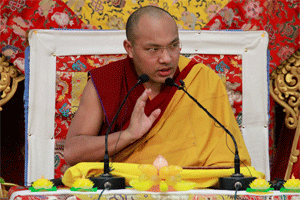27th Feb –Vajra Vidhya Institute, Sarnath.
On the sixth day of his Spring Teachings the 17th Gyalwang Karmapa, Ogyen Trinley Dorje, cut straight to the core of an issue that is vital not only for the sustainability of our contemporary world, but also within our individual lives as Buddhist practitioners. Exploring the topic from many different angles, the Gyalwang Karmapa discussed his views on whether Buddhist practitioners should eat meat or not, and if so, when and how it may be acceptable to do so.
“A few years ago at one of the Kagyu Monlams I spoke about the topic of vegetarianism, giving up eating meat. You could say it was an announcement, but it was really like making a suggestion. Since then many years have passed, and over the years I’ve heard people say various things. Some people have even said, ‘Oh, Ogyen Trinley Dorje says that if you don’t give up eating meat then you’re not a Kagyupa.’ Now, it actually wasn’t me who said that. It was the 8th Karmapa Mikyo Dorje who said that. So it wasn’t my idea, and it’s not like I said you better give up meat or else you’re not a Kagyupa.”
In fact, there are different ways we can interpret the 8th Karmapa’s advice, the 17th Gyalwang Karmapa continued. If we take a looser interpretation of Mikyo Dorje’s words, then by eating meat you can say that you’re not a truly pure Kagyu practitioner. “There are many great Kagyu masters who have eaten meat, so it is very difficult to merely say that eating meat means that you have faults. But eating meat is something that all of us who practice the dharma need to think about very carefully.”
The Gyalwang Karmapa, himself a pure vegetarian, then turned to his own life as an example. “When I spoke about this, I was primarily thinking about the way I lead my own life. I can’t really do anything about how other people lead their lives, but in terms of thinking about myself there are some reasons for this.” He then explained two key reasons that he personally does not eat meat. The first reason is the intense suffering that the animals who are killed go through. Every single day millions of animals are killed to feed us, and many are subjected to terrible conditions to provide us with food. Just a few days previously the Gyalwang Karmapa had shared a story of how, as a child in Tibet, when animals were killed for his family’s food he felt unbearable, pure compassion for them.
The second reason he doesn’t eat meat, the Gyalwang Karmapa continued, is because of his Mahayana training in seeing all sentient beings as his mothers. “We say I am going to do everything I can to free sentient beings from suffering. We say I am going to do this. We make the commitment. We take the vow. Once we have taken this vow, if then, without thinking anything about it, we just go ahead and eat meat, then that is not okay. It is something that we need to think about very carefully.”
The Gyalwang Karmapa then acknowledged that there are some circumstances in which eating meat is allowed, or even necessary. He explained that within the Buddhist Vinaya, or rules for monks and nuns, eating meat is allowed mainly when one is ill, but only if three conditions are met: we must not have seen, heard, or thought that the animal was killed particularly for us to eat it. Meat is allowed when a person is sick, the Gyalwang Karmapa clarified, or for those people who need more nourishment and have great difficulty nourishing themselves without it.
“But when you eat meat in these situations you should not just eat it in an ordinary sort of way,” he continued. “You first need to meditate on compassion for one session—compassion for all sentient beings in general, but especially for this particular animal whose flesh is in front of you. Then you should recite the mantras of the Buddha’s name, as well as mantras that can help purify misdeeds. Only then should you start eating the meat.”
Yet his guidance did not stop there. Returning to the Mahayana training of seeing all sentient beings as mothers, the Gyalwang Karmapa explained further. “When you start eating the meat you have to think about it in a particular way. You should think of it as being the meat of your mother or your father or your child. You should think of eating it in that way, and so it’s when you think of it as being your mother’s or your child’s meat, then that is when you can eat it.”
We must also have a pure motivation when we eat the meat, the Gyalwang Karmapa continued. “We should not eat the meat in order to enjoy it, because it is delicious. We should not eat it because we want to enjoy the great flavor and savor what we are eating. Instead we should eat the meat only in order to keep ourselves alive.”
To avoid any misunderstanding, the Gyalwang Karmapa repeated the need for each individual to reflect deeply on the issue: “Now, I did not say that we need to immediately give up eating meat. I understand that it’s difficult to give up eating meat. But I did say that we need to think about it carefully. When we eat meat, if we are someone who has entered the path of the Mahayana, someone who has begun to think of all sentient beings as their father, their mother, or their child, in terms of someone who practices in this way it’s really something that we need to consider very carefully.”



